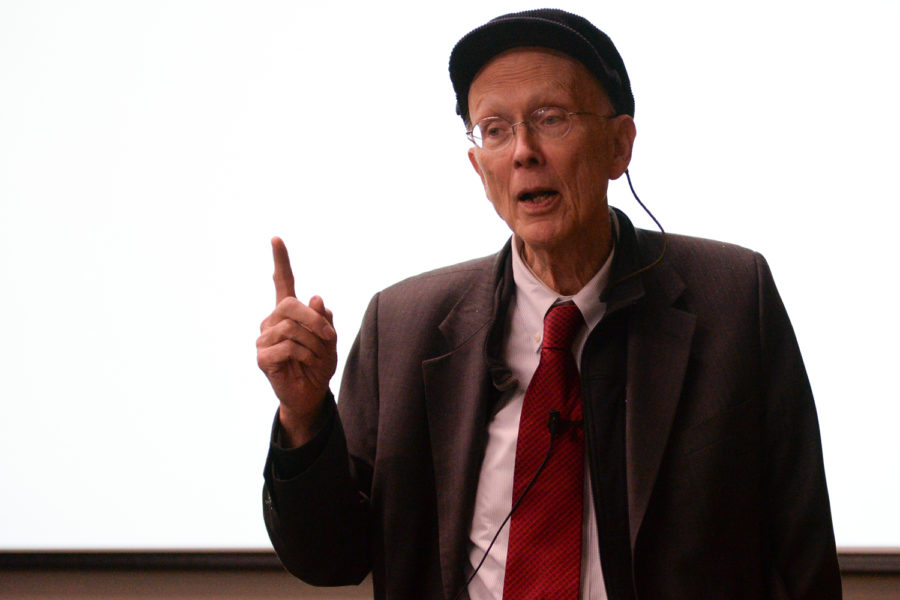Harvard University professor George Whitesides spoke to a crowd of about 150 people Thursday night in Benedum Hall about how chemistry can be utilized in all industries to bring opportunities for invention and productivity.
“The tools from the health care and manufacturing industries can provide what we need in the real world in order to bring more opportunities that involve chemistry and innovation,” Whitesides said.
The department of chemical engineering at the Swanson School of Engineering named Whitesides the 2018 Covestro distinguished lecturer — an award that recognizes excellence in chemical education, outreach and research. The lecture was sponsored by Covestro LLC, a world-leading supplier of high-tech polymer materials, and has been given annually at Pitt since 1992.
Whitesides received his bachelor’s degree from Harvard University in 1960 and his doctorate from the California Institute of Technology in 1964. He began his independent career as an assistant professor at the Massachusetts Institute of Technology, and is now the Woodford L. and Ann A. Flowers University Professor in Harvard University’s department of chemistry and chemical biology. His current research interests include several forms of chemistry and other scientific disciplines.
“We research the question of our environmental maintenance in order to understand how to make the world run,” Whitesides said. “These aspects all involve chemistry.”
Whitesides discussed problems young researchers should consider in the future, like the growing popularity of machine workers which could make human workers obsolete. He stressed the importance of chemistry in dealing with these impending problems.
“These are all interesting problems that have chemical components,” Whitesides said.
Whitesides said the solutions to most of the problems that occur in our society depend on chemistry.
“Maintenance, health care and manufacturing are all questions that have to do with the real world,” Whitesides said. “The tools these industries provide are what we need in the world.”
Students who attended Whitesides’ lecture were intrigued by the idea that chemistry can be used to solve many issues in today’s society. Chemical engineering graduate student Jocelyn Mackay was interested in Whitesides’ point that everything is chemically related.
“When you look at companies like Amazon or Google, they’re never looking for chemists and never looking to fix chemical problems,” Mackay said. “But it was interesting how he [said] that there are chemical problems and we need to fix them.”
Samuel Batchelder, a doctoral student in chemical engineering at Pitt, appreciated that Whitesides’ lecture stressed that research plays a very important role in our society.
“I like his emphasis on the significance of things in the research world [that] can get so caught up on defined details that you forget about the real impact [research] will leave in the world,” Batchelder said.
Throughout the lecture, Whitesides talked about how student work, especially in chemical research, can make a huge impact on issues that are prevalent in our society.
“Part of what the world recognizes in what we do is this idea of innovation, and the structure that is managed with chemistry,” Whitesides said. “The idea is that the government is what drives the empirical knowledge that is derived and used on the basis of scholarship, which produces better things for our society.”
Whitesides encouraged students to pursue research that would make a difference in the world.
“Students who are currently working on research should start on something you know is important and can leave a positive impact on our society,” Whitesides said.


